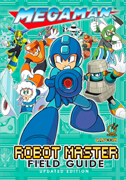
The Reploid Condition
by James “GS Edgeman” Riser

Mega Man lives in the science fiction universe with the creations of Isaac Asimov, Philip K. Dick, and many others. The Mega Man story may have been inspired by many things, but some very cool parallels can be drawn from the novel Do Androids Dream of Electric Sheep? by Philip K. Dick.
In the novel, a bounty hunter named Rick Deckard is charged with the task of hunting down rouge androids and “retiring them,” a process usually performed with a gun or laser tube. Androids in the novel are very well designed, and blend in seamlessly with the general population. Rick’s only (legal) way to differentiate androids from humans is to make suspects submit to a psychological exam similar to the polygraph. The exam monitors their eye and facial muscle reactions to certain questions to see if the person (or machine) has a sense of empathy.
These rouge androids actually killed their owners before escaping into the population, an action that goes against their original programing; going Maverick, I think, would be an appropriate analogy. Reploids and the androids from Dick’s novel differ greatly; however, the theme of empathy is something that both share in some capacity. Most fiction involving robots or the like bring up a most interesting question: What exactly is the human condition?

Empathy is the ability to share and experience feelings with another being. Mega Man X has a profound sense in justice that arguably surpasses those of other Hunters. Presumably, the Reploids that were manufactured after X were also instilled with the same inclination toward justice and what is right, but the main difference between X and the subsequent Reploids is the 30 year period which he spent in a capsule undergoing additional tests.
Doctor Martin Hoffman, a professor of psychology at New York University, wrote several papers examining the relationship between empathy and justice motivation. He claims there’s a definite connection between the two, especially when a person is experiencing “empathic distress.”
Empathic distress is when a person can experience the negative feelings of another, and these negative emotions incite people to do what’s morally right. In theory, people who are able to empathize with their peers will be more inclined to make a morally correct choice. According to Hoffman’s work, X’s sense of justice is directly tied to his sense of empathy. The entire line of new Reploids were able to experience feelings like X, however it seems that he had a stronger sense of justice.
Perhaps X’s 30 year stay in his capsule allowed him to develop a greater sense of empathy in his personality software, though since X was deactivated during this time, this may not be the case. It is mentioned that while the later Reploids were closely related to the design of X, Dr. Cain couldn’t copy Dr. Light’s designs perfectly. One of the facets that Dr. Cain may have not been able to replicate is X’s ability to empathize with other beings, which may be the factor that separates X from the others and why everyone else seems to be at risk of becoming a Maverick.

The Mavericks in the Mega Man X series seem to be inspired by the androids in Dick’s novel; they lack empathy, and are able to harm others to accomplish their goals. The androids didn’t want to be servants to humans, so they killed their masters and escaped to Earth.
Reploids who turned Maverick seemed to feel that humans looked down on them, so they felt the need to rise up. They brought harm to human beings because they felt it was necessary, and what allowed them to do that was a shift in their empathic capacity. They couldn’t empathize with the people they were hurting; rather, they focused only on their goals.
It’s known that X doesn’t like to fight, especially against his own kind but feels that he must. His goal would be to have Reploids and humans to live in harmony, rather than eliminate either group or have one be subservient to the other. His emotions allow him to see both sides of the battle, leaving him in a state of constant empathic distress.
This all leads to the question: “What does it mean to be human?”
When dynamic emotions are considered, the human condition consists of more than flesh, blood and organs. Andy from Asimov’s story, Bicentennial Man already seemed human, even before he underwent an operation to have his mechanical innards replaced with organic ones.

To have blood, flesh and organs is to be human by only definition. One of the most important traits that we have, in my opinion, is the ability to share emotions. Empathy allows people to relate to their peers and hopefully discourage them from doing harm to each other. This can explain why society labels horrible crimes involving torture and murder “inhuman,” and that the victims are being “dehumanized.” While X doesn’t have the physical properties of a human, he has a humanistic value that some people lack. The purpose of most robotic protagonists is to blur the line between man and machine; however, X represents the ideal member of both.
Bear in mind that this is one-hundred percent speculation, and I don’t think the developers had these ideas in mind when creating the story line. Also, morality and justice are subjective, and their definitions can get quite ambiguous. I’ve heard that Keiji Inafune cited Blade Runner (the movie inspired by Dick’s novel) as an inspiration for the X series, though I couldn’t find the interview where he stated that.
I find it fun and interesting to make these connections and delve deeper into the story line, digging up the underlying themes. X’s character challenges players to ask themselves what it means to be a human, whether it’s our actions or our anatomy that define us.
(If anyone has the aforementioned interview with Keiji Inafune, or a link to it, please post it in the comments section!)
Prev/Next in Category(s)
Prev/Next by Date





Comments